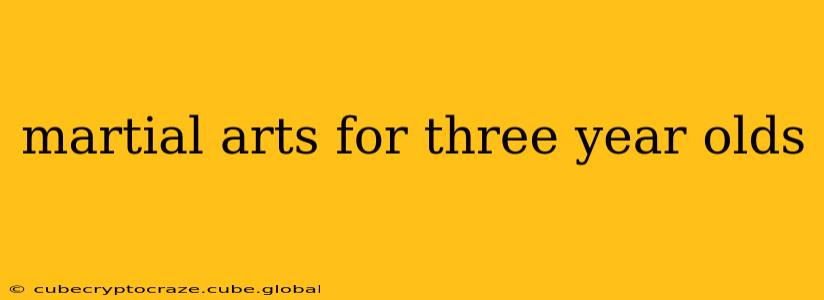Introducing your three-year-old to martial arts can be a fantastic decision, offering a blend of physical activity, discipline, and social interaction. But choosing the right program and understanding its benefits is crucial. This guide will explore the world of martial arts for three-year-olds, addressing common questions and concerns parents often have.
What are the Benefits of Martial Arts for Three-Year-Olds?
Martial arts classes designed for preschoolers are far removed from the intense training of adult classes. Instead, they focus on building fundamental skills in a fun and engaging way. The benefits are numerous:
- Gross Motor Skill Development: Activities like jumping, kicking, and rolling help refine coordination, balance, and agility.
- Improved Focus and Discipline: Following instructions and practicing movements build concentration and self-control, essential skills for this age group.
- Increased Self-Confidence: Mastering new skills boosts self-esteem and a sense of accomplishment.
- Socialization and Interaction: Classes provide opportunities to interact with peers, learning cooperation and teamwork.
- Early Introduction to Healthy Habits: Martial arts promote physical activity and a healthy lifestyle from a young age.
What Martial Arts are Suitable for Three-Year-Olds?
Several martial arts styles are well-suited for preschoolers, typically adapting their techniques to be age-appropriate and safe:
- Age-Specific Karate: Many karate schools offer specialized programs for young children, emphasizing games and fun over rigorous training.
- Aikido: This martial art focuses on self-defense techniques that often involve rolling and movement, which are developmentally appropriate.
- Judo: With its emphasis on throws and grappling, Judo adapted for young children can build strength and coordination while teaching respect and discipline.
- Tae Kwon Do: Similar to karate, Tae Kwon Do's focus on kicking and punches can be adapted for young learners, often incorporating games and creative movements.
Remember to prioritize programs that emphasize fun and positive reinforcement rather than strict discipline or competition at this age.
How Do I Choose the Right Martial Arts School for My Three-Year-Old?
Selecting the right school is vital. Look for these key factors:
- Qualified and Experienced Instructors: Experienced instructors know how to engage young children and create a safe and positive learning environment. Inquire about their credentials and experience with preschoolers.
- Age-Appropriate Curriculum: The class should be specifically designed for three-year-olds, with modified techniques and a play-based approach.
- Safe and Clean Environment: The training facility should be clean, well-maintained, and equipped with age-appropriate safety measures.
- Small Class Sizes: Smaller classes allow instructors to provide more individual attention, ensuring safety and effective learning.
- Positive and Encouraging Atmosphere: The overall atmosphere should be supportive, encouraging, and free of harsh discipline or pressure.
Is Martial Arts Too Aggressive for a Three-Year-Old?
The notion of martial arts being aggressive is a misconception, especially in age-appropriate programs. Well-structured classes focus on building self-control, respect, and discipline, rather than aggression. Instructors utilize age-appropriate techniques and emphasize safety and control throughout the classes. The goal is to teach children to handle themselves confidently and responsibly, not to promote aggressive behavior.
What Should I Expect in a Typical Class?
A typical class for three-year-olds might include:
- Warm-up activities: Fun games and exercises to get them moving and engaged.
- Basic movements: Introduction to fundamental kicks, punches, blocks, and stances, adapted for their age and abilities.
- Games and activities: Fun games that incorporate martial arts skills, reinforcing learning through play.
- Cool-down and relaxation: Quiet activities to help children wind down after an active session.
Remember, the primary focus is on fun, engagement, and skill development, laying a strong foundation for future learning if they wish to continue.
What if My Child is Shy or Doesn't Want to Participate?
It's completely normal for a child to be hesitant at first. Start by visiting the class and allowing your child to observe. Speak with the instructor about your child's personality and concerns; they have experience handling diverse personalities and can adapt their approach accordingly. Positive encouragement and patience from you are crucial to helping your child overcome their shyness and embrace the experience.
Martial arts for three-year-olds offers a unique opportunity for growth and development. By choosing the right program and supporting your child, you can help them build valuable life skills in a fun and engaging way.
